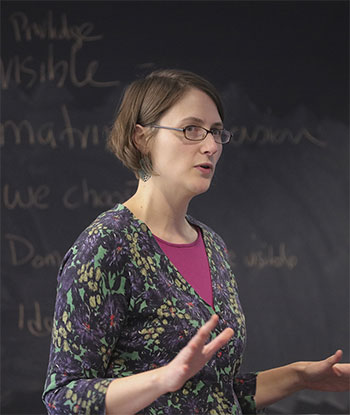Pulteney Street Survey
On paradox, power and learning through discomfort
by Beth Belanger
Associate Professor of American Studies

Our experiences are very personal but they’re also patterned and shaped by particular historical, social, political and economic contexts. A lot of what we do in American Studies is looking at the past in light of the present, to help us understand how we got where we are. I tend to emphasize how to analyze cultural artifacts, constituted by and reflective of a particular place and time, because we can apply the same analysis to our place and time. In my American Studies intro course, one artifact we look at is “Strange Fruit,” Billie Holiday’s anti-lynching song from the ’30s, and how it operates as a protest song compared to protest songs from ’60s. We always end the unit looking at contemporary pop music, comparing the legacy of something like “Strange Fruit” to something like the Dixie Chick’s “Gaslighting” or Childish Gambino’s “This Is America.” The end goal is not to definitively come to “the truth” but to posit an idea, a theory about what are the structures at work behind songs like these. As students move through the major, we work with them to develop good questions that will lead to a fruitful area of inquiry. In that way, American Studies helps the fish see the water and I hope students walk out of classes and can’t quite look at the world the same way.
I’m teaching a new course this fall, “Storytelling with Data: Quantitative Tools for the Humanities.” The goal of the course is to give students basic quantitative skills around gathering data but also the tools to interrogate the data. When I conceived of this course, I wanted students to use historical data sets to see how humanities majors might find them useful for research, but watching the events of this spring and summer unfold I decided I want them to delve into in our contemporary moment and examine how data is used as a weapon against disenfranchised communities. I want students to look at what information gets collected, who collects it and for what purpose, because even data, it turns out, are not unbiased.
Students drawn to American Studies tend to be students comfortable with ambiguity and paradox because American Studies really thrives in the place between the bright promises articulated in the founding documents and what’s happening on the ground — between American ideals and how they actually play out. To do that work in the public realm, you can’t get away from, or ignore, issues of power and difference that exist in this country. That work can engender discomfort, even a defensiveness, when it comes to issues of privilege and I share that with my students because it’s important to acknowledge that it’s hard to talk about. My parents never talked about race, or why we didn’t have a diverse social circle, so in for me teaching some of this material, and for white students, there’s a worry you’re going to say something that doesn’t come off right. But that’s what learning feels like — we’re creating new neural pathways and that is hard. Don’t turn from those uncomfortable feelings; sit with them, recognize that’s the product of learning.
